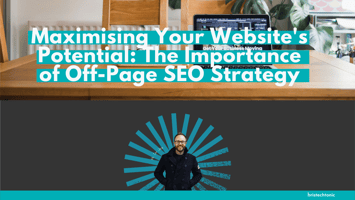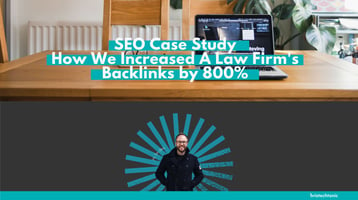Search Engine Optimisation (SEO) ensures people can find your website online. Doing it properly...
What Is Link Building?
You're working hard to build out your business website and boost your search engine ranking. You've started working on your internal link strategy, making it easy for anyone who's already on your website to find additional relevant information.
Have you also developed an external link strategy? Link building is the process of getting third-party websites to share links to your website. It's a little more complicated than internal linking, but the payoff is worth the effort.
When you're new to the world of SEO, your best bet is to outsource link building to a professional. Let's take a closer look at what link building is, the best link building strategies, and how an SEO professional can help.
Why Link Building Matters
Popular search engines like Google have several different criteria they're scanning for when determining search engine ranking. Ultimately, they want to give the highest slots to the websites with the most credibility.
Things like navigability, speed, and keyword usage all come into play. However, even the best internally-focused SEO strategy is going to lag without an external link building strategy.
When other websites link to one of your pages, it has the potential to function as an endorsement. (We'll explain why this isn't always the case later.) The more "endorsements" you have across the internet, the more likely search engines are to see your website as a valuable and credible source deserving of one of those top slots.
Link Building Examples and Their Impact on SEO
In the simplest terms, backlinks can include any links outside of your website that lead back to your website. Some types of link building will have a bigger impact on your SEO than others. Here are just a few examples of backlinks and the role they play in SEO.
Guest Posts
A guest post is a blog post or interview written for a website by an outside source. The idea, here, is that you can create content surrounding your niche or expertise and share it on a website with a shared target audience.
When you're in the early stages of building your website's SEO, guest posting will be a valuable link building tool. That said, guest posts take time and may result in low-ranking backlinks, like a link tucked away in your author bio.
Organic Mentions (aka Earned Links)
When done properly, SEO can become a self-propagating machine. As you boost your visibility with great content, you increase your potential for organic mentions or earned links.
When other businesses or blog owners build content, their goal is to create plenty of value for their readers. They may link to a study that supports their claims or a blog post that provides additional context. With time and effort, your website can start earning invaluable organic mentions.
Manually Added Links
Is there a way to sprinkle links to your website all over the internet without having to write new content or ask for permission? The short answer is yes, but it won't get you very far.
You can make posts or edits on websites like business directories and forums (e.g., Reddit or Quora) and add links to your website whenever it might be relevant. You can also comment on existing blog posts with links to your website. This may drive a bit of new traffic to your website, but it probably won't count as much of an "endorsement."
Social Media Marketing
Social media platforms are technically third-party websites that you can use to market your business. You can even include links in your profile or, depending on the platform, individual posts. Do these register to search engines as credibility-boosting backlinks?
Not exactly. Social media is great for boosting brand awareness and fostering relationships with your target audience, but they don't do much for SEO. Social media also drives no more than 5% of business web traffic and you'll still need backlinks on other platforms.
What Makes a Good Backlink?
The type of backlink you use (e.g., a guest post vs. a social media post) isn't the only thing that will impact the success of your link building strategy. Here are some of the key factors to consider when deciding where and how to target your backlink efforts.
Authority
In the world of SEO, authority refers to quality. Everything from popularity and reputation to layout and readability impact a website's authority.
Landing a backlink on a website with high authority rankings will give your own website a bigger boost. For example, a backlink from The Guardian or The Economist will do more than a backlink from a small blog. Google recently announced an initiative to reduce low-quality and unoriginal content by 40%, making it all the more important to target authoritative, reputable websites.
Relevance
Taking a strategic approach to link building can prevent the scramble to grab every backlinking opportunity that comes your way. This is important because Google's algorithms also scan for relevance.
In this case, relevance refers to the relationship between your website and the website or post sharing your backlink. If there's no relevance between the two, the algorithm tends to register the mention as spam, rather than a trustworthy endorsement.
Function
Here's where things get a little more tricky. You may discover that you've earned some organic mentions only to realize the link is a "nofollow" link. Though "nofollow" links are functional, they're essentially invisible to search engines, meaning that they don't register as SEO-boosting endorsements.
It's also easier than you might think for links to break over time, rendering them useless for click-through purposes. While they won't directly undo any SEO boosts you got from link building, they will increase bounce rates and reduce time spent on your site, which can hurt SEO rankings.
How to Start Link Building
Now that you know more about what link building is and what opportunities to look for, it's time to talk about building an actual link building strategy. Here are some of the best ways to increase and diversify your backlinks across the web.
Reach Out
One of the best ways to start link building is to reach out to prospective websites. You can inquire about guest posts or you can simply ask for a link to your website to be incorporated into their in-house content.
Make sure to keep requests short, direct, and friendly. Make it clear why your backlinks are a good fit for their typical content and share the URL for your website so they can take a closer look. If there's a specific web page from your site you're hoping to backlink, send that, as well.
Focus on Authority
Make sure that you're also putting plenty of time and effort into your own online presence. Strong, authoritative content incentivises other platforms to share your links. Depending on your niche, you may want to share many types of content, including:
- Blog posts
- How-to guides
- E-books
- Infographics
- Videos
- Case studies and original research
There are also link building tools you can use to make your website easier to find. HARO (Help a Reporter Out) is a great one that helps writers and content creators connect with experts in different fields and industries.
Jump On Broken Links
When your own links break, you're in a bit of trouble. When another website's links break, you stand to benefit. When you come across broken backlinks to competitor websites, you can reach out to the publisher and suggest that they replace that broken link with one of yours.
How do you find broken links? Another handy link building tool is the Ahrefs broken link checker, which allows you to scan entire web pages for broken links. If there's a relevant third-party website you'd love to be featured on, run their URL through the broken link checker and see what opportunities arise.
Track Your Business Mentions
As your brand reputation grows, your business is likely to pop up in various corners of the internet, from local newspapers to industry blogs. Some writers and publishers may fail to add a link to your website even when they mention your business by name.
Make sure you're tracking any new online mentions of your business by setting up Google Alerts. Make sure to include any variations of your brand name or product that might pop up. When you get a new mention with no link, reach out to the writer or publisher with a link they can use to make their content more useful to you and their readers.
Outsource Link Building to Optimise Your Link Building Strategy
With this guide, we've just started to scratch the surface of link building. As you can see, while the concept of backlinks is simple, building a successful link building strategy requires a lot of time and effort. When you outsource link building to a professional, you get better results all while doing what you do best: staying focused on your business.
BrisTechTonic was designed with small businesses and small SEO budgets in mind. I'm here to create customised solutions that make sense for your needs, not just provide quick fixes or expensive upgrades. Contact me and together we'll create the ideal link building strategy that will put your website on the map.




